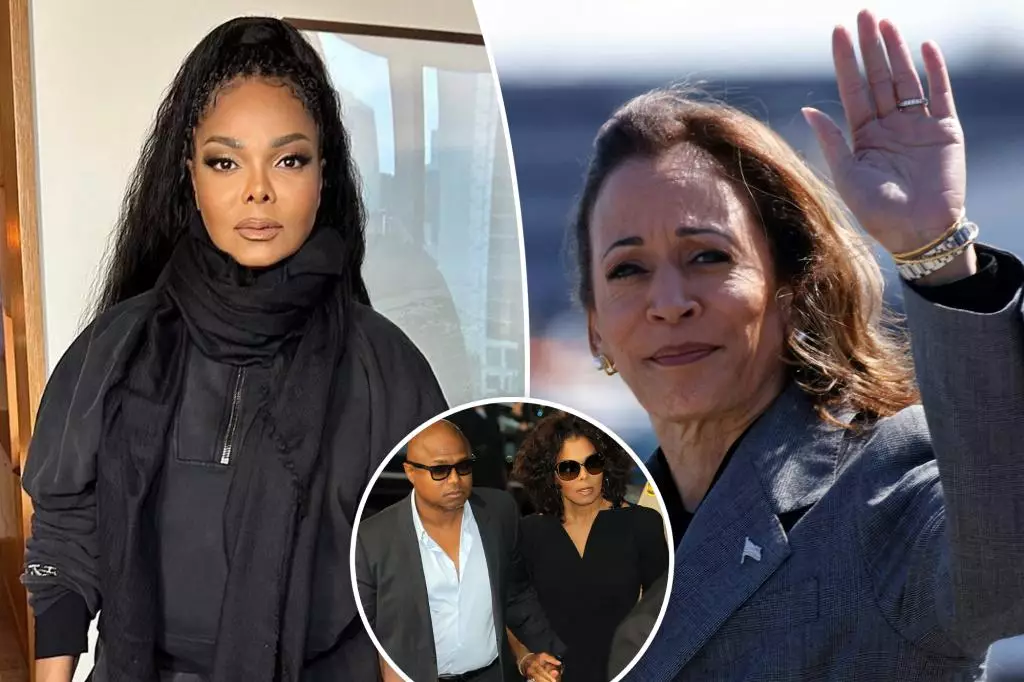Janet Jackson has long posed as a powerhouse in the music industry, with her iconic hit “Control” epitomizing her stance on self-determination and empowerment. However, recent developments have left many questioning whether Jackson is in command of her narrative—or if she’s relinquished that power to others, particularly within her inner circle. The singer’s recent comments regarding Vice President Kamala Harris raised eyebrows, igniting a public relations fiasco that not only shocked fans but also alarmed insiders who worry about her legacy in light of perceived mismanagement.
This unexpected controversy arose following an interview with the Guardian, where Janet made ambiguous remarks about Harris’s racial identity. Her commentary included suggesting that Harris isn’t “black” but rather “Indian,” alongside speculative statements about her parentage. The backlash was immediate and severe, with accusations ranging from ignorance to outright insensitivity, giving rise to a reckoning about Jackson’s standing as an advocate for marginalized communities. For a figure who has built her brand on themes of diversity and social justice, these comments strike a jarring note and disrupt the narrative she has long controlled.
As the fallout unfolded, fingers were pointed toward her brother Randy Jackson, who serves as her manager. Reports from trusted sources indicate that there is a growing sentiment among industry insiders that Randy may not possess the savvy required to deftly navigate such stormy waters. In the wake of Janet’s remarks, insiders claim that his influence has become increasingly overbearing, prompting concerns that he is inadvertently sabotaging her carefully curated image. The dichotomy of their familial relationship and professional roles becomes crucial here; Janet’s reliance on Randy could render her particularly vulnerable to potential missteps.
A source noted that the once-tight grip Janet held on her public persona might now be slipping. They described a scene where Janet was blissfully unaware of the broader implications of her statements while socializing in Paris. The idea of “letting things blow over” not only reflects a diminished urgency to engage with the damage but also speaks volumes about the lack of strategic oversight.
In a particularly strange twist, a man named Mo Elmasri surfaced, claiming to act on Janet’s behalf as her manager while issuing public apologies following the fallout. This only compounded the confusion as Janet’s publicity team quickly distanced themselves from Elmasri, declaring him without representation authority. Such miscommunication serves to highlight a deeper issue: who exactly is steering the ship during turbulent times? This disarray is alarming, especially considering Janet’s decades-long career.
Reports imply that Randy Jackson may have been the one to initially bring Elmasri into the fold, thereby intensifying concerns about the decision-making happening behind the scenes. With insiders suggesting that neither Janet nor Randy truly understands the gravity of the situation, there’s a palpable worry that her storied career—marked by notable advocacy and potent social commentary—stands to be tarnished. As someone who has previously taken bold stands against various societal injustices, the discord between her musical message and personal blunders could potentially alienate loyal supporters.
At the heart of the controversy lies a perplexing contradiction: how can an artist synonymous with empowerment and unity make statements that appear to deny the multifaceted nature of identity? Observers have pointed out that Janet’s situation reflects not just on her individual persona, but also on the ongoing struggles within the broader artistic community to navigate identity, authenticity, and cultural representation. The perception that Janet is living in a “bubble” away from current realities raises further questions about her future work. Furthermore, statements about unreleased music and stalled projects reveal a troubling lack of direction in her career trajectory.
Instead of connecting through her artistry during these tumultuous times, Janet seems preoccupied with external perceptions—a paradox for an artist who once proclaimed to be in complete control. Even as she prepares for a Las Vegas residency, the worries from within her camp underline a cautionary tale: navigating fame is a delicate endeavor, characterized by layers of responsibility that extend beyond mere performance. The task of rebuilding trust after a PR crisis is daunting, and the road ahead may require Janet to reclaim the narrative she has temporarily lost.
As Janet Jackson balances her esteemed past with the contemporary challenges she faces, the imperative for personal and professional reinvention looms large. This critical juncture offers the potential for introspection and growth as she reassesses her partnerships, artistic direction, and public persona. If she is to foster a stronger connection with her audience, Janet must confront the chaos within her camp and reaffirm her commitment to the values she once so fervently championed. Whether or not she can regain her footing will undoubtedly shape the future of her legacy, leaving fans eager to witness the next chapter of this iconic artist’s journey.

